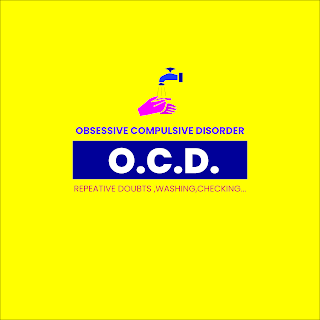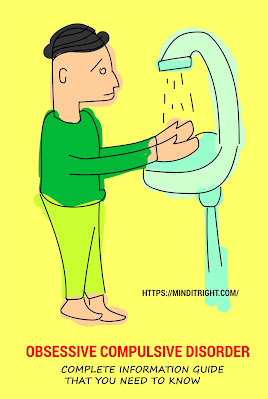OBSESSIVE COMPULSIVE DISORDER – SYMPTOMS AND PREVALENCE EXPLAINED IN SIMPLE LANGUAGE
Table Of Contents
1.
What are different types of
obsessions/compulsions?
o Checking behavior
o WASHING EXCESSIVELY
CONTAMINATION FEAR :-
o HOARDING :-
o RUMINATION
o INTRUSIVE THOUGHTS
o RELATIONSHIP INTRUSIVE
THOUGHTS:-
o SYMMETRY AND ORDERLINESS:-
2.
HOW COMMON IS THE OBSESSIVE
COMPULSIVE DISORDER ?
o PREVALENCE OF OBSESSIVE
CANPULSIVE DISORDER:-
3.
WHAT IS AGE OF ONSET IN
OBSESSIVE COMPULSIVE DISORDER ?
4.
GENDER DIFFERENCE :-
5.
(CO-MORBID CONDITIONS)
What are different types of obsessions/compulsions?
Checking behavior
Repetitive checking behavior in response to obsessive
thought; which has content that if he does not check the thing some disaster
may happen.
e.g. (1) Checking gas stove knob
repetitively due to fear of explosion (obsession)
(2) Water taps checking – fear water
wastage, flooding property.
WASHING EXCESSIVELY CONTAMINATION FEAR :-
Fear that things are getting contaminated that may lead
to illness and ultimately death of a loved one or oneself.
 |
| image credits- unsplash.com |
The person keeps washing and cleaning hands
repetitively.
Starts avoiding using public toilet, shaking hands,
touching door knobs, using public telephone, eating in restaurant.
Sometimes due to fear of getting contaminated person may
stop cleaning kitchen and bathroom.
HOARDING :-
 |
| image credits- unsplash.com |
It is inability to discard useless or worn out
possessions.
There may be a rigid unrealistic thinking behind
hoarding . The person keeps feeling that some harm may happen if they throw
away things.
Or if they throw away that thing , someone else
may get contaminated with those things.
Sometimes he feels that he may need that object later.
The person feels the object has special emotional importance.
RUMINATION
It is excessive prolonged train of thoughts that
is non-productive.
Eg. A person may keep on thinking what will happen to
him after death.
INTRUSIVE THOUGHTS
Thoughts that are repetitive, disturbing and after
horrific and repugnant in nature. Thoughts may be ‘aggression towards loved
ones’. Religious thoughts like ‘may loose control and abuse God’ while praying.
Sexual thoughts or images during religious prayers.
RELATIONSHIP INTRUSIVE THOUGHTS:-
Person constantly keeps doubting faith of other person
and keeps seeking reassurance and approval.
SYMMETRY AND ORDERLINESS:-
The person feels everything must be in symmetry. Things
should be at right place.
 |
| image credits- unsplash.com |
If someone disturbs the symmetry or orderliness
the person becomes restless and anxious and tries to correct the situation
immediately.
HOW COMMON IS THE OBSESSIVE COMPULSIVE DISORDER ?
PREVALENCE OF OBSESSIVE CANPULSIVE DISORDER:-
In India life time prevalence is = 0.6% (2)
In Taiwan 0.5-0.9%
As per one U.S. population survey 1 in 100 adults gets
OCD
Children 1 in 200 (3)
WHAT IS AGE OF ONSET IN OBSESSIVE COMPULSIVE DISORDER ?
Between late teens and early adulthood mean age of onset
is 22 years.
GENDER DIFFERENCE :-
Male and Female are equally affected in adults.
But among adolescents, boys are more commonly affected
then girls.(4)
(CO-MORBID CONDITIONS)
What are other conditions which
are commonly associated with OBSESSIVE COMPULSIVE DISORDER ?
People with OBSESSIVE COMPULSIVE DISORDER are commonly
affected by others mental disorders like social phobia, special phobia,
alcohol use disorder, panic disorder, eating disorders.
Read detailed explanation in Hindi
OBSESSIVE COMPULSIVE DISORDER – CAUSES PROGNONSIS AND TREATMENT
Table Of Contents
·
Obsessive
Compulsive Disorder
·
WHAT
ARE THE CAUSES OF OCD? (ETIOLOGY).
o IS
IT INHERITED IN FAMILY ? ( GENETICS ).
o IS
IT DUE TO BRAIN CHEMICAL IMBALANCE ?
o NEUROTRANSMITTERS:-
o DOES
IT HAPPEN DUE TO EMOTIONAL (PSYCHOLOGICAL) STRESSORS?(5)
o IS
IT LEARNED BEHAVIOUR?
o BEHAVIOURAL
FACTORS :-
·
ARE
PEOPLE WITH CERTAIN PERSONALITY ARE PRONE TO THIS DISORDER ?
·
WHAT
IS PROGNOSIS ( FUTURE OUTCOME ) AND COURSE OF OBSESSIVE COMPULSIVE DISORDER ?
o WHAT
ARE THE CHANCES OF GETTING BETTER ?
·
WHAT
IS TREATMENT OF OBSESSIVE COMPULSIVE DISORDER ?
o Medications
:-
o ARE
THE MEDICINES ADDICTIVE?
o Psychotherapy
o Cognitive
Behaviour Therapy ( C.B.T. ):-
o Exposure
and response prevention :
o SYSTEMATIC
DESENSITIZATION:-
o FLOODING
:-
o SATURATION:-
o THOUGHT
STOPPING :-
o Electro
convulsive therapy
o Neuro-surgery
o Family
Therapy for OBSESSIVE COMPULSIVE DISORDER :-
o GROUP
THERAPHY :-
·
Conclusion
Obsessive Compulsive
Disorder
Abstract:
Obsessive Compulsive Disorder ( O.C.D.) is a psychological condition
which has multi-factorial etiology ; and is associated with neurochemical
changes in the brain . With the psycho-education and increased awareness
in general population, the condition can be diagnosed at an early stage
and can be treated effectively. The stigma and family burden secondary to the
disorder can be minimized to remarkable extent. The disorder can be
treated successfully with medications and psychotherapy.
FOR BETTER UNDERSTANDING AND SIMPLIFICATION WE ARE DIVIDING THE
ARTICLE IN TWO PARTS :
WHAT ARE THE CAUSES OF OCD?
(ETIOLOGY).
Different hypothesis about etiology have been proposed.
IS IT INHERITED IN FAMILY ? ( GENETICS ).
Available
genetic data on OCD supports hypothesis that the disorder has a significant
genetic component.
Some family studies show 30% of first degree relatives of OCD
patient are afflicted the disorder.
IS IT DUE TO BRAIN CHEMICAL IMBALANCE ?
NEUROTRANSMITTERS:-
Different clinical drug trials conducted support the
hypothesis that dysregulation of certain brain chemicals ;
neurotransmitters serotonin is involved in the symptom formation of OCD.
DOES IT HAPPEN DUE TO EMOTIONAL (PSYCHOLOGICAL) STRESSORS?(5)
- Important
life events like bereavement; family breakup, exam stress/failure ,
may trigger OCD in people who are prone to develop the condition (due to
genetic factors).
IS IT LEARNED BEHAVIOUR?
BEHAVIOURAL FACTORS :-
When
a person discovers that certain action reduces anxiety attached to an
obsessional thought, he or she develops avoidance towards some actions and
situations ; and develops inclination towards certain behaviours , which
reduces anxiety .
Because
of their efficacy in reducing a painful secondary drive (anxiety), the
avoidance strategies become fixed as learned patterns of compulsive behaviour.
ARE PEOPLE WITH CERTAIN PERSONALITY ARE PRONE TO THIS DISORDER ?
In
people with Obsessive compulsive personality disorder {OCPD} (a personality
which follows rigid rules, excessively fastidious, excessive punctual,
perfectionist traits.) there are 15-30% chances of getting OCD.
WHAT IS PROGNOSIS ( FUTURE OUTCOME ) AND
COURSE OF
OBSESSIVE COMPULSIVE
DISORDER ?
WHAT ARE THE CHANCES OF GETTING BETTER ?
Prognosis/course
of the disorder differs from person to person.
It
is a treatable disorder . Patients start showing improvement in 2- 4 weeks of
starting the treatment .
In
a Study the 58 subjects with OCD when given treatment for 49 months ; at
follow up 62% of the subjects were in full remission (symptom free). (6)
With a prolonged treatment chances of getting relapse reduce
remarkably.
WHAT IS TREATMENT OF
OBSESSIVE COMPULSIVE
DISORDER ?
Treatment
includes many options like medications , psychotherapy , Electroconvulsive
therapy .
Medications :-
SSRIs (Selective Serotonin Reuptake Inhibitors) are
anti-depressants which have action on serotonin, a neurotransmitter which is
known to cause the disorder. Fluoxetine, Fluvoxamine, Sertraline, Escetalopram,
Paroxetine, are commonly used medicines from this category , for treating
OBSESSIVE COMPULSIVE DISORDER .
Tricyclic
Anti-depressants :- Clomipramine is the tricyclic antidepressants used in of
OCD
It
is observed that if the patient is treated for prolonged period like 1-2 years
the chance of getting relapse reduces.
ARE THE MEDICINES ADDICTIVE?
Medicines
are not addictive and they are safe for long term use . Long term use of
medication does not mean it has generated addiction.
ARE MEDICINES SLEEPING PILLS?
READ MORE ABOUT MYTHS RELATED TO PSYCHOLOGICALMEDICINES.
No
. Though some of the medicines have side effect of producing drowsiness ; they
are not sleeping pills (hypnotic pills ).(8)
Now with advances in science most of the medicines used to treat
OBSESSIVE COMPULSIVE DISORDER . are
non-sedative.
Psychotherapy
Psychotherapy has been found to be helpful in treating
OBSESSIVE COMPULSIVE DISORDER .
Psychotherapy
along with medications if administered in combination the improvement is faster
than any single therapy .
Cognitive behavior Therapy ( C.B.T. ):-
Cognitive
behavior therapy focuses both on cognition ( thinking ) and behavior .
Following are some commonly used CBT
Exposure and response prevention :
The
person is exposed to the condition about which he/she is avoidant . At the same
time the compulsion is prevented .
e.g.
The person with obsession of getting contaminated is made to touch public
toilet door knob and after that the person is told to avoid washing hands for
certain period of time . Even though the person has anxiety in mind and impulse
to wash hands, he is prevented to do so . This may produce severe anxiety for
some time , but is found help in treating the disorder .
SYSTEMATIC DESENSITIZATION:–
With
the help of therapist, relaxation techniques are taught to the person. Then
gradually is exposed to ever increasing anxiety provoking stimulus. Gradual
exposure along with relaxation, slowly reduces the anxiety and avoidance of
aversive stimulus .
FLOODING :-
The
patient is exposed directly to most anxiety provoking stimulus, while using the
relaxation skills learnt.(9)
SATURATION:-
Patient is told to think of the thought (e.g. 10–15 min) over a number of days (10-15 days), the obsession can lose its strength.
THOUGHT STOPPING :-
Person
identifies obsessive thoughts, then arrests it by doing an opposite incompatible
response.
Electro convulsive therapy
In
severe treatment resistant cases and in cases with co-morbid suicidal
depression Electro Convulsive Therapy is used effectively .
Neuro-surgery
Some
times in non responding severe OCD cases neurosurgery is recommended. (11)
Family Therapy for
OBSESSIVE COMPULSIVE
DISORDER :-
It
involves the family members; who are equally disturbed due to the disorder of
the patient.(10)
They
are psycho-educated regarding the disorder and promoted to help the patient to
get better.
This reduces conflicts and argument in family. Many family
members feel anger towards the person with
OBSESSIVE COMPULSIVE DISORDER . They feel that the
person is doing the rituals intentionally. But after pycho-education their
acceptance towards the disorder and patient improves.
GROUP THERAPHY :-
The groups of patients with
OBSESSIVE COMPULSIVE DISORDER are very helpful as
they discuss their problems with each other and observe that they are not alone
with the condition. They are motivated by seeing improvement in other patients.
Conclusion
Even though the psychological condition OBSESSIVE COMPULSIVE DISORDER , is disturbing the person , it may or
may not be visible externally . This condition can significantly disturb a
person’s personal , social and occupational life . It is a treatable condition
. Medications and psychotherapy play major role in relieving
disorder symptoms .




No comments:
Post a Comment